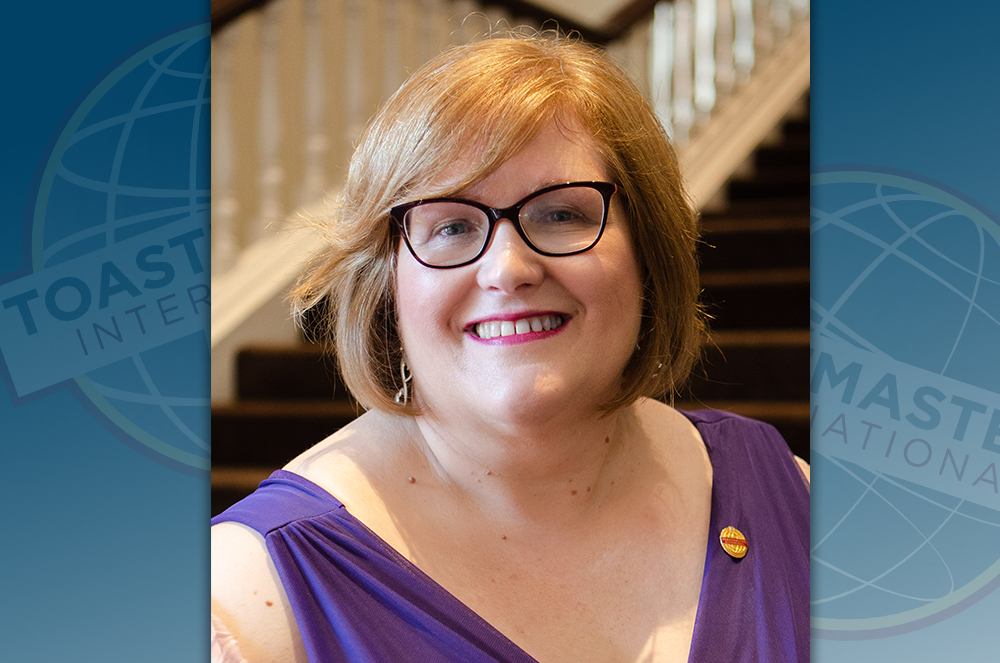Mentoring is a powerful tool in Toastmasters, benefiting not only mentees, but mentors and other club members as well. Productive mentoring relationships help mentees reach their personal goals and allow mentors to share their knowledge and help members grow. A strong mentoring program strengthens a club as well, by continually engaging and challenging members in new ways.
But what happens when a club doesn’t have enough mentors? Or when a mentee requires a skill that no one in their club possesses? That’s when Districts can help. Here are two Districts that took different approaches to expanding the opportunities for mentors and mentees to meet each other.
District 31:
Meet Your Match!
By Caryl Lattof, DTM
In early 2022, District 31 (Northeast United States) recognized a recurring challenge: How do members find an appropriate mentoring partner when there are none available in their home club? The solution was to create a District-wide system for Toastmasters to mentor or be mentored by members from other clubs.
As the Area 94 Director at the time, I organized a team of Toastmasters with an interest in mentoring. To help members find a partner, we created Meet Your Match! The concept was to introduce potential mentors and mentees through a Zoom event and let the pairs decide if they wanted to work together. Research tells us that self-matched mentoring relationships endure longer than appointed pairs.
The Preparation
Before the event, each participant submitted an application, explaining their needs and goals. Members applying to be a mentee answered questions about their short- and long-term goals, ideal mentor expertise, and preferences for timing and frequency of meetings. Questions for the mentor focused on skills and mentoring style.
To promote Meet Your Match!, I emailed information to Division and Area Directors, Club Presidents, and Vice Presidents Education. Program information was also shared at Club Officer Trainings, on the District 31 website, and in the monthly newsletter. We decided to allow a maximum of 15 mentors and 15 mentees at the event.
Research tells us that self-matched mentoring relationships endure longer than appointed pairs.
In order to maximize the opportunity, once we received all applications, each mentor’s qualifications were shared with mentee candidates, and vice-versa, one week prior to the event. I asked one mentor and one mentee to serve as General Evaluators, and created an agenda.
I reiterated that the decision to work together in a mentoring relationship was entirely up to the attendees, that the decision did not have to be made immediately, and that post-event conversation was encouraged before selecting a match.
During the Program
During the event, mentors and mentees met through a speed-dating format, with each mentor candidate in a private breakout room. Applicant mentees were allowed five minutes to chat with each mentor, asking questions that would help to decide if this person was a potential match.
In the spirit of Toastmasters, a Zoom Master and timer announced when participants needed to move to the next room. At the end of the program one mentor and mentee shared their perspectives about what worked well and where improvements could be made. Mentees were then encouraged to reach out to mentors for a longer conversation to determine compatibility.
The Results
We successfully held Meet Your Match! three times and spawned 20 mentoring pairs. The feedback from the matched pairs has been overwhelmingly positive, and some pairs decided to extend their six-month commitment because they developed a genuine rapport that remained fruitful for both parties.
District 31 found Meet Your Match! to be a game-changer for deepening the Toastmasters experience. Effective mentoring helps to engage members by connecting them to others throughout the District to identify strengths, build community, and develop leadership skills. Sharing the wealth of talent and expertise harbored in individual clubs across an entire District allowed us to form a bigger pool of potential mentors and mentees to work together.
Caryl Lattof, DTM, is a member of Boston West Toastmasters Club in Needham, Massachusetts, and the author of Coffee With Caryl, a blog dedicated to sharing practices that strengthen membership and lead to highly functioning Toastmasters clubs. Learn more at caryl31.wordpress.com.
District 120:
District Mentor Pool
By Nina John, DTM
In 2020, District 120 (South India) suffered a double whammy. Our District formed in July of that year after District 82 divided, resulting in many of the more experienced and senior members remaining in the older District. Then came the pandemic, and like Districts around the world, we lost many members. We needed to build up our resources.
Knowing that mentoring is a core activity to encourage, motivate, and guide newcomers, we started a District Mentor Pool. We invited members from each Division who had been in their club for at least two years to join the committee. As an added incentive, those who participated in the project could simultaneously work on completing the Pathways Mentor Program.
We met weekly over Zoom and started by brainstorming questions like “What makes someone qualified to be a mentor?” and “What are the skills needed to be a mentor?”
Having a District-wide pool of mentors gave clubs greater resources to draw from rather than just doing a random pairing among club members.
We all agreed that the first qualification needed was an attitude of sharing and caring, of wanting to help more people benefit from Toastmasters. The second qualification focused on domain expertise—how much did each potential mentor know about Toastmasters?
Then we mapped out questions new members might have. We divided the answers into categories—is this a skill to be learned or information to be imparted? For instance, organizing a speech requires practicing and learning a skill, whereas understanding Pathways consists of taking in information.
We felt having a basic understanding of the following areas made for a more successful, effective mentor:
- Pathways. Understand the different paths and be able to help mentees choose a path that aligns with their goals.
- Club Meeting Roles. Know the responsibilities of each role, as well as what the Club Executive Committee does. Ideally, know how to conduct business meetings, and understand basic parliamentary procedure.
- Toastmasters Hierarchy. Know the distinctions between and responsibilities of Areas, Divisions, Districts, regions, and the Board of Directors.
- Contests. Understand the value of contests, the various types, and how they are conducted. Know what is involved in running a contest, including the judges’ role and the ballots.
- Speaking Skills. Be able to offer help and insight in choosing a speech topic, speechwriting, delivery tips, and stage presence, as well as being an evaluator.
- Advanced Opportunities. Understand the High Performance Leadership project and the Distinguished Toastmaster designation. Be familiar with District conferences and the opportunities they provide.
Mapping out the skills in categories made it easier to find or identify potential mentors in each club and Division who were interested in and comfortable with certain areas and match them with mentees who wanted to develop those skills. For instance, we found some mentors who preferred to do only speech contest mentoring while others felt happier helping navigate a leadership journey.
We launched the District initiative by having members of the Mentor Pool Committee give a presentation to their respective Divisions and spearhead Mentor Bootcamps if requested. Each club was required to have a Mentor Club Coordinator who would liaise with the Division Mentor Pool member.
All clubs were asked to match mentees (especially new members) with mentors. If the club had few mentors or none with the category of expertise needed, the Division representative would help find one based on the skills the mentee was hoping to develop.
Having a District-wide pool of mentors gave clubs greater resources to draw from rather than just doing a random pairing among club members.
Mentoring is the lifeblood of Toastmasters, something that benefits both the mentee and the mentor in equal measure, leading to lifelong friendships. There may be a learning curve along the way, but the experience is infinitely rewarding.
Nina John, DTM, is a communication catalyst and coach. She is a charter member of Chennai Toastmasters, the first club in Tamil Nadu, India. She is the former chair of the District 120 Mentor Pool Program.
Caryl Lattof, DTM, and Nina John, DTM
Caryl Lattof, DTM, is a member of Boston West Toastmasters Club in Needham, Massachusetts, and the author of Coffee With Caryl, a blog dedicated to sharing practices that strengthen membership and lead to highly functioning Toastmasters clubs. Learn more at caryl31.wordpress.com.
Nina John, DTM, is a communication catalyst and coach. She is a charter member of Chennai Toastmasters, the first club in Tamil Nadu, India. She is the former chair of the District 120 Mentor Pool Program.
Related Articles

Mentorship
Club Mentor Program: A Win-Win-Win!

Mentorship
Advantages of Being a Mentor

President's Message



 Previous
Previous

 Previous Article
Previous Article